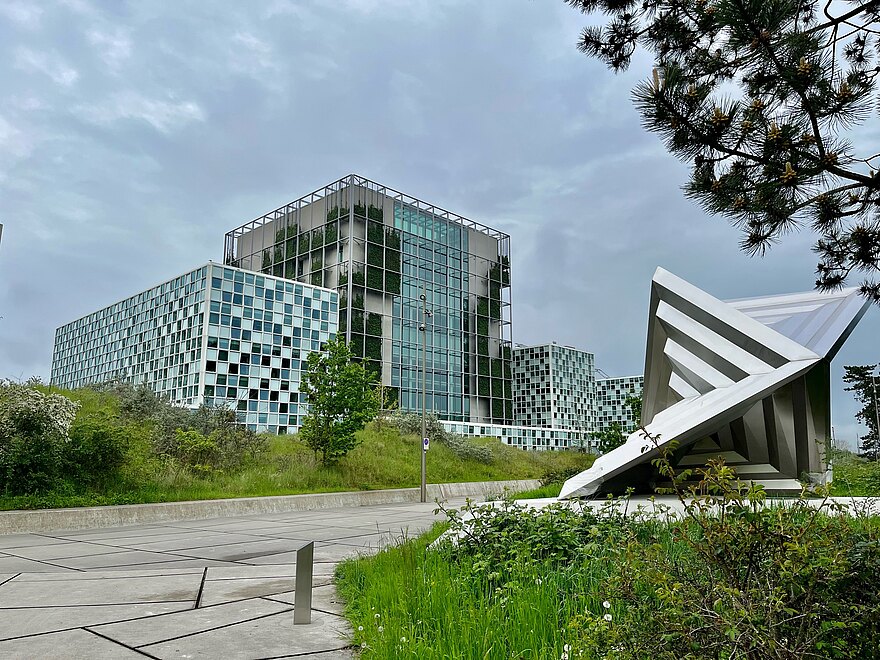5 June 2025, by Astrid Walter and Dr Pablo Gavira Díaz
1. The declaration of the Libyan government to accept the jurisdiction of the International Criminal Court
On 12 May 2025, the Registrar of the International Criminal Court (ICC or Court) received a declaration submitted by the Libyan government announcing Libya’s acceptance of the jurisdiction of the ICC over crimes allegedly committed in its territory from 2011 to the end of 2027. This brief comment examines the background and contentions that have defined the ICC´s involvement in the Libyan context as well as the procedural framework governing a state’s adherence to the authority of the Court.
The conflict in Libya has been under the radar of the Court since late February 2011, when the Security Council of the United Nations (UN) decided to refer the situation in Libya to the ICC Prosecutor. The first arrest warrants were issued by the ICC Prosecutor as early as 27 June 2011, just four months after the UN Security Council referral. Several arrest warrants have since been issued. Currently, eight unsealed warrants of arrest are outstanding, the latest having been issued on 18 January 2025 against Osama Elmasry Njeem. Three further arrest warrants, including against former Head of State Muammar al-Qaddafi, have been withdrawn over the years due to the death of the suspects. Last year, the ICC Prosecutor announced that ICC’s investigative and judicial efforts in Libya aimed to conclude by 2025.
2. Background of the Libyan conflict
In 2011, pro-democratic protests against Libya’s long-term autocratic leader, Muammar al-Qaddafi, were repressed. The armed revolt and a 7-month NATO-led international military intervention eventually resulted in the overthrow of Qaddafi’s regime, an interim constitution and, in July 2012, to the first elected interim government termed the ‘General National Congress’. In an effort to bring about political stability and put an end to the armed conflict between multiple rival parties, the UN established the UN Support Mission in Libya (UNISMIL) in 2011 and has since extended its mandate annually. UNISMIL has helped to organise and hold general elections in 2014, which, however, resulted in a state politically divided between two rival governments based in Tripoli (called ‘Government of National Unity’) and Benghazi (called ‘House of Representatives’), respectively.
The violence that broke out in 2011 grew into a civil war by 2014 and sporadic and intermittent fighting is ongoing. The investigation opened by the ICC Prosecutor in March 2011 revealed evidence of the commission of crimes against humanity and war crimes in the context of these armed activities. In 2020, UNISMIL brokered a cease-fire and in March 2021 established a new interim government called the ‘Government of National Unity’, led by Prime Minister Abdulhamid Dbaibah. The cease-fire further included a roadmap to end the armed conflict between the rival governments and arrange public and free elections in late 2021. The subsequent relative calm allowed for municipal elections across Libya, but state-wide presidential and parliamentary elections have been postponed repeatedly. In 2022, militias affiliated with the eastern-based administration argued that Prime Minister Dbaibah’s mandate had ended and withdrew their recognition of the Tripoli-based government, proclaiming a ‘Government of National Stability’ based in Sirte. To date, Libya remains politically split between two rival governments, neither one of which has received a democratic mandate.
On 12 May 2025, a new wave of violent activities between rival militias emerged in Tripoli, following the reported killing of a powerful militia leaderandpublic protests calling for elections and the resignation of Dbaibah’s government. Civilian casualties were reported. UNISMIL is again involved in mediations aspiring to establish a new cease-fire.
3. The exercise of jurisdiction by the International Criminal Court
As the foundational treaty of the ICC, the Rome Statute sets out multiple references to ‘jurisdiction’ to define the scope of the Court’s authority. In the domain of criminal law, States exercise jurisdiction based on four grounds: territoriality, protection, personality (referring to the nationality of the offender or the victim) and universality. Territorial jurisdiction is the primary legal basis on which a state may execute the process of its courts, whereas jurisdiction based on the nationality of the offender or the victim, as well as on the right of a state to protect its legitimate interests, is less common.
A distinctive feature of the ICC is that its statute does not tightly constrain the exercise of prosecutorial discretion. Article 13 of the Rome Statute outlines three mechanisms for “triggering” the exercise of jurisdiction by the Court: State Party referral, UN Security Council referral and proprio motu authority of the ICC Prosecutor. As noted in the first section of this comment, the UN Security Council adopted Resolution 1970 on 26 February 2011, whereby it referred to the ICC the situation in Libya since 15 February 2011.
Moreover, the ICC was established with the consent of those states that fall under its authority. By becoming parties to the Rome Statute, states formally recognise the competence of the Court with respect to genocide, crimes against humanity, war crimes and the crime of aggression. Where such crimes are committed either on the territory of a State Party or by its nationals, the alleged perpetrators may be subject to criminal prosecution. The Rome Statute further limits the reach of the ICC by giving priority to the States’ own courts. Only when national courts are “unwilling or unable” to prosecute can the ICC take over.
Besides the territorial and personal jurisdiction established by a State Party’s ratification of the Rome Statute, Article 12(3) also allows a non-State Party to accept the Court’s jurisdiction on an ad hoc basis. This provision explains that the “accepting State” must “cooperate with the Court without any delay or exception”, including in the investigation and prosecution of crimes under the Court’s jurisdiction. In their declaration of acceptance, states’ discretion might be limited to temporal jurisdiction, such as designating a starting date or a situation defining the Court’s jurisdiction period. In the case at hand, the declaration lodged by the Libyan government in May 2025, accepting ICC’s jurisdiction under Article 12(3) of the Rome Statute, confers the Court with jurisdiction over alleged crimes committed in Libyan territory from 2011 to the end of 2027.
4. Implications of Libya’s declaration to accept the jurisdiction of the International Criminal Court
While the ICC has exercised jurisdiction since 2011, Libya’s official acceptance now reaffirms its binding legal commitment to fully and unconditionally cooperate with the Court. The Prosecutor of the ICC welcomed the declaration submitted by the Libyan government and added that it “represents a profound step to a renewed platform for collective action between the ICC and Libya in pursuit of justice”. He further urged the handover of Osama Elmasry Njeem, who is suspected of crimes against humanity and war crimes allegedly perpetrated in Tripoli prison facilities. Mr Njeem was arrested in Italy on 18 January 2025, pending legal proceedings for his surrender. However, on 21 January 2025, he was reportedly released and returned to Libya without prior notice to the Court. To date, Mr Njeem remains at large.
The Njeem case illustrates the absence of credible and transparent national-level prosecutions for international crimes. For a successful cooperation with the ICC, Libya’s judicial system must exhibit willingness, independence and capacity to prosecute such cases. Professor Dr Christoph Safferling, Director of the Nuremberg Academy, while welcoming Libya’s acceptance of ICC jurisdiction, noted that “cooperation goes hand in hand with execution”. The announcement “brings new prospects for the ICC and Libya at a time when international law is facing significant contestation”, in his words, “but rhetoric must be accompanied by actions and, therefore, reforms” at the national level. Director Safferling also added that this development “opens windows of opportunity for constructive dialogue and new alliances which may serve to secure justice and uphold victims’ rights”. (aw/pg)



